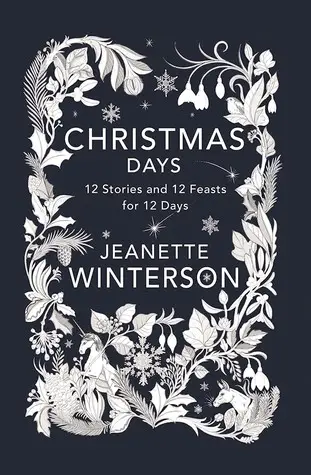Jeanette Winterson is my favorite working author. If 100 of you pick up Oranges Are Not The Only Fruit, The Passion, and The Stone Gods, I think a good handful of you will say the same.
Two weeks after Christmas, I saw this book on the New Arrivals shelf at my local public library. The timing was a bit off for a book that is obviously about Christmas, but I said What the Hey. How often does your favorite author surprise you with a new book?
Jeanette Winterson is one of the commanding voices in the British literary scene. It turns out she also has a soft spot for the Christmas season as she readily explains in the introduction to this book. Among fans of her work, Ms. Winterson’s biography is well-known and frequently shows up in her work in one form or another. She grew up in an fundamentalist Christian home and was a bit of a prodigy as a child preacher until she came out as gay in her mid-teens. Things got rocky at home after that, to use classic English understatement. She left, went to college, and became an amazing writer. Her religious views are complicated, but her affection for the Christmas season is unambiguous. She is a treasure whose every written word drips with wisdom and…
“This is a story [Charles Dickens’ A Christmas Carol] so powerful it can survive the Muppets.
Oh no she didn’t! She did not just insult A Muppet Christmas Carol! It was Michael Caine’s greatest work of his career!
OK, let’s just move on. Maybe her taste in Christmas family fare is questionable, but she is still arguably our best living writer. Her work spans genres from historical fiction to sci-fi to memoir. Christmas Days is a collection of 12 short stories broken up by 12 stories of her life and her friends, punctuated by recipes for Christmas treats from main courses to desserts, snacks, and cocktails.
The stories are at once simpler than her novels while also giving a taste of her immense skill as a writer. The first story is a fairy tale about a troubled couple meeting a little girl who tells them she is the Spirit of Christmas. It is followed by an account of making mince pies with her mother, with the recipe. Among the other twelve stories are another fairy tale about a snowman coming to life, a thriller about a woman surviving a blizzard, a ghost story, a wedding story that takes place in the distant past, and other more “real” stories around Christmas time.
Between her works of fiction are the stories she tells of her friends and her family, including personal stories of reconciling with her father shortly before his death and of never reconciling with her mother before it was too late, as well as more fun stories of some of her writer friends and of her wife. These vignettes are invariably enjoyable, even delightful.
The recipes are not the point. Most are simple and not detailed enough to allow the dishes to be prepared. Some of them sound unpleasant to me. Winterson has no ambition to be a professional cook. The recipes accentuate the stories and are things that are meaningful to her and to her personal Christmas rituals. I didn’t try any of them.
Come for the short stories. Stay for the vignettes. The recipes are lagniappe. Jeanette Winterson is amazing. This collection of stories may serve as a good introduction to her work for readers who are otherwise unfamiliar, as long as the reader keeps in mind that Ms. Winterson’s work is usually less straightforward and more ambitious than what is presented here. Or maybe you should pick up The Passion, instead.


